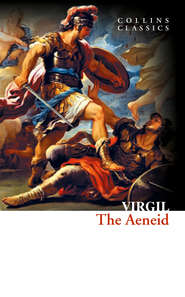скачать книгу бесплатно
And now the happy harbor is in view.
Minerva’s temple then salutes our sight,
Plac’d, as a landmark, on the mountain’s height.
We furl our sails, and turn the prows to shore;
The curling waters round the galleys roar.
The land lies open to the raging east,
Then, bending like a bow, with rocks compress’d,
Shuts out the storms; the winds and waves complain,
And vent their malice on the cliffs in vain.
The port lies hid within; on either side
Two tow’ring rocks the narrow mouth divide.
The temple, which aloft we view’d before,
To distance flies, and seems to shun the shore.
Scarce landed, the first omens I beheld
Were four white steeds that cropp’d the flow’ry field.
‘War, war is threaten’d from this foreign ground,’
My father cried, ‘where warlike steeds are found.
Yet, since reclaim’d to chariots they submit,
And bend to stubborn yokes, and champ the bit,
Peace may succeed to war.’ Our way we bend
To Pallas, and the sacred hill ascend;
There prostrate to the fierce virago pray,
Whose temple was the landmark of our way.
Each with a Phrygian mantle veil’d his head,
And all commands of Helenus obey’d,
And pious rites to Grecian Juno paid.
These dues perform’d, we stretch our sails, and stand
To sea, forsaking that suspected land.
“From hence Tarentum’s bay appears in view,
For Hercules renown’d, if fame be true.
Just opposite, Lacinian Juno stands;
Caulonian tow’rs, and Scylacaean strands,
For shipwrecks fear’d. Mount Aetna thence we spy,
Known by the smoky flames which cloud the sky.
Far off we hear the waves with surly sound
Invade the rocks, the rocks their groans rebound.
The billows break upon the sounding strand,
And roll the rising tide, impure with sand.
Then thus Anchises, in experience old:
‘’Tis that Charybdis which the seer foretold,
And those the promis’d rocks! Bear off to sea!’
With haste the frighted mariners obey.
First Palinurus to the larboard veer’d;
Then all the fleet by his example steer’d.
To heav’n aloft on ridgy waves we ride,
Then down to hell descend, when they divide;
And thrice our galleys knock’d the stony ground,
And thrice the hollow rocks return’d the sound,
And thrice we saw the stars, that stood with dews around.
The flagging winds forsook us, with the sun;
And, wearied, on Cyclopian shores we run.
The port capacious, and secure from wind,
Is to the foot of thund’ring Aetna join’d.
By turns a pitchy cloud she rolls on high;
By turns hot embers from her entrails fly,
And flakes of mounting flames, that lick the sky.
Oft from her bowels massy rocks are thrown,
And, shiver’d by the force, come piecemeal down.
Oft liquid lakes of burning sulphur flow,
Fed from the fiery springs that boil below.
Enceladus, they say, transfix’d by Jove,
With blasted limbs came tumbling from above;
And, where he fell, th’ avenging father drew
This flaming hill, and on his body threw.
As often as he turns his weary sides,
He shakes the solid isle, and smoke the heavens hides.
In shady woods we pass the tedious night,
Where bellowing sounds and groans our souls affright,
Of which no cause is offer’d to the sight;
For not one star was kindled in the sky,
Nor could the moon her borrow’d light supply;
For misty clouds involv’d the firmament,
The stars were muffled, and the moon was pent.
“Scarce had the rising sun the day reveal’d,
Scarce had his heat the pearly dews dispell’d,
When from the woods there bolts, before our sight,
Somewhat betwixt a mortal and a sprite,
So thin, so ghastly meager, and so wan,
So bare of flesh, he scarce resembled man.
This thing, all tatter’d, seem’d from far t’ implore
Our pious aid, and pointed to the shore.
We look behind, then view his shaggy beard;
His clothes were tagg’d with thorns, and filth his limbs besmear’d;
The rest, in mien, in habit, and in face,
Appear’d a Greek, and such indeed he was.
He cast on us, from far, a frightful view,
Whom soon for Trojans and for foes he knew;
Stood still, and paus’d; then all at once began
To stretch his limbs, and trembled as he ran.
Soon as approach’d, upon his knees he falls,
And thus with tears and sighs for pity calls:
‘Now, by the pow’rs above, and what we share
From Nature’s common gift, this vital air,
O Trojans, take me hence! I beg no more;
But bear me far from this unhappy shore.
’Tis true, I am a Greek, and farther own,
Among your foes besieg’d th’ imperial town.
For such demerits if my death be due,
No more for this abandon’d life I sue;
This only favor let my tears obtain,
